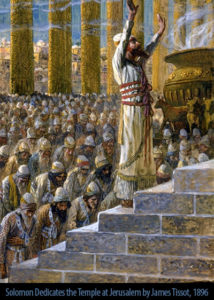Again I saw all the oppressions that are done under the sun. And behold, the tears of the oppressed, and they had no one to comfort them! On the side of their oppressors there was power, and there was no one to comfort them. And I thought the dead who are already dead more fortunate than the living who are still alive. But better than both is he who has not yet been and has not seen the evil deeds that are done under the sun.
Then I saw that all toil and all skill in work come from a man’s envy of his neighbor. This also is vanity and a striving after wind.
The fool folds his hands and eats his own flesh.
Better is a handful of quietness than two hands full of toil and a striving after wind.
Again, I saw vanity under the sun: one person who has no other, either son or brother, yet there is no end to all his toil, and his eyes are never satisfied with riches, so that he never asks, “For whom am I toiling and depriving myself of pleasure?” This also is vanity and an unhappy business.
Two are better than one, because they have a good reward for their toil. For if they fall, one will lift up his fellow. But woe to him who is alone when he falls and has not another to lift him up! Again, if two lie together, they keep warm, but how can one keep warm alone? And though a man might prevail against one who is alone, two will withstand him–a threefold cord is not quickly broken. – Ecclesiastes 4:1-12
At the end of chapter 3 in Ecclesiastes, Preacher Solomon concludes with the statement “that there is nothing better than that a man should rejoice in his work, for that is his lot [or portion].” However, he is not finished with the subject. The enjoyment of good labor and eating and drinking is not a solitary pursuit. Instead, here in chapter 4, we find wisdom about how to enjoy life, food, and drink: enjoy these with the community of the faithful. Eat with people, drink with friends, work as contributing to the community. This is the bond that is not quickly broken. Certainly, this passage was understood in Solomon’s day especially as the ritual, festival meals of Israel, but it’s not difficult to see how it applies to the church today.
The first part of the chapter considers oppression, and particularly what we might call political oppression. “On the side of their oppressors there was power, and there was no one to comfort them.” Indeed, when you look around in the world today, you see that there truly is nothing new under the sun! It would be easy to think of this as general tyranny since the last chapter spoke in those terms, but Preacher has a different angle here. It is about relationships. Twice, just in the first verse, he says “and they had no one to comfort them.” That means that suffering injustice is much worse if you must do it alone. Solomon is so sure of it that he believes it is better to be dead than suffer oppression in isolation. “And I thought the dead who are already dead more fortunate than the living who are still alive.” At least they are finished with the torment of condemned isolation!
Then I saw that all toil and all skill in work come from a man’s envy of his neighbor. This also is vanity and a striving after wind. Another observation he makes is related and exposes that there is nothing new today. In the first few verses, the oppression comes from people outside of us, but the second observation points out the harm we do to ourselves. A great deal of making work an idol comes from rivalry or envy. This is the opposite and a great enemy to the true community Solomon is putting forth. He believes there are real joys and good things in this life, but only working for oneself and labor that alienates is not the way to get these joyful things. They actually impoverish regardless of whatever other gain they may yield.
There is a great deal more in this chapter, but again, Jesus exemplifies every point here. He certainly suffered the solitude of condemned isolation (garden, trial, cross), and yet He has been building a community all along that lasts. In fact, the gospel builds the community of the church. A person who hears and believes the gospel will (in some parts of the world and at times in history) risk their very lives to assemble together as the church. Jesus tells us He is with us even to the end of the Age and has sent another Comforter. The wise will embrace these great gifts of God with great gratitude.
Come hear it preached and enacted in the supper with Jesus this Sunday.
